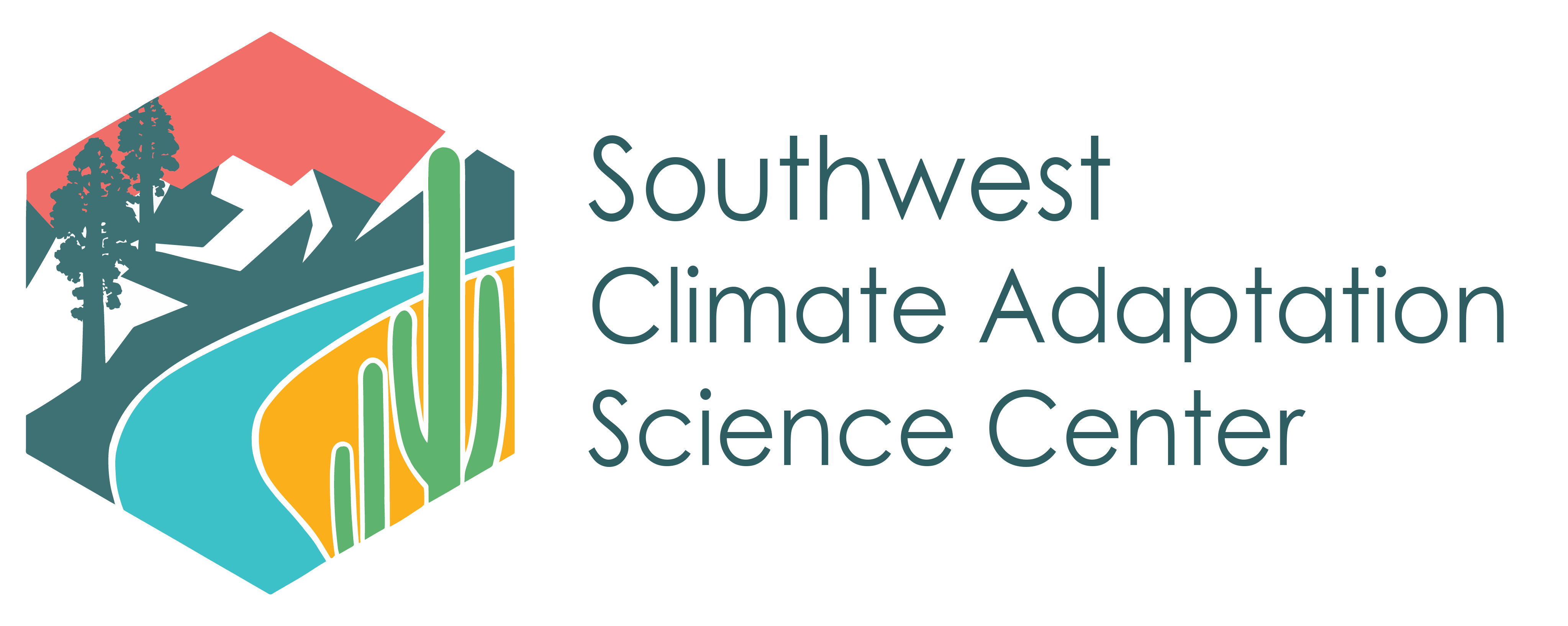Projects and Publications
SW CASC Funded Tribal Projects
| Funding Year | Title | Principal Investigator(s) | Project Description |
|---|---|---|---|
| 2022 |
Uniting Western Restoration Strategies and Traditional Knowledge to Build Community Capacity and Climate Resilience on the Navajo Nation |
Elise Gornish | Link |
| 2022 |
The Importance of Forests for All People: Understanding Forest Recovery Priorities, Management Options, and Policy Needs for Tribes in Post-Fire Landscapes |
Courtney Schultz |
|
|
2022 |
Shifting from Extractive to Self-determined: Enhancing Indigenous Research and Data Governance in Southwest Climate Adaptation Initiatives |
Dominique David-Chavez | Link |
| 2022 |
Improving Water Resilience and Availability Through Cultural Prescribed Fire as a Management Tool on Yurok Tribal Lands |
Mathieau Marineau | Link |
| 2022 |
Cycles of Renewal: Returning Good Fire to the Chumash Homelands |
Alyssa Rosemartin | Link |
| 2021 |
Indigenous-Led Climate Adaptation Strategies: Integrating Landscape Condition, Monitoring, and Cultural Fire with the North Fork Mono Tribe |
Beth Rose Middleton | Link |
| 2021 |
Mapping Riparian Vegetation Response to Climate Change on the San Carlos Apache Reservation and Upper Gila River Watershed to Inform Restoration Priorities: 1935 to Present |
Victoria Wesley | Link |
| 2021 |
Monitoring and Adaptation to Conserve Clear Lake Cultural Keystone Species |
Sarah Ryan | Link |
| 2021 |
Landscape Management Practices on the Pueblo de San Ildefonso |
Raymond Martinez | Link |
| 2021 |
Northern California Tribal Climate Adaptation and Science Integration Research Project |
Christopher Ott | Link |
| 2020 |
Cultural Burning as a Climate Adaptation Strategy |
Beth Rose Middleton | Link |
| 2019 |
Forest Monitoring and Tree Ring Data to Inform Forest Management on the Navajo Nation |
Margaret K. Evans | Link |
| Funding Year | Title | Principal Investigator(s) | Project Description |
|---|---|---|---|
| 2016 | Continued Partnerships to Increase Capacity for Tribal Natural Resource Adaptation Planning | Gregg Garfin | Link |
| 2016 | Pyramid Lake Paiute Tribe Traditional Knowledge and Climate Change Adaptation | Karletta Chief | Link |
| 2015 | Building Partnerships to Assess Tribal Adaptation to Climate Change and Science Needs in the Southwest | Katharine Jacobs | Link |
| 2012 | Climate Change Vulnerability of the Pyramid Lake Paiute Tribe in the Southwest | Karletta Chief | Link |
Tribal Publications
Keepers of the Flame: Supporting the Revitalization of Indigenous Cultural Burning
C. Adlam, Middleton, B. Rose, Almendariz, D., Goode, R. W., and Martinez, D. J., “Keepers of the Flame: Supporting the Revitalization of Indigenous Cultural Burning”, Society & Natural Resources, 2021.
Becoming Storms: Indigenous Water Protectors Fight for the Future
B. Rose Middl Manning, Martinez, D., Reed, K., and Mascarhenas, M., “Becoming Storms: Indigenous Water Protectors Fight for the Future”, in Lessons in Environmental Justice From Civil Rights to Black Lives Matter and Idle No More, 2020.
Returning the Yurok Forest to the Yurok Tribe: California’s First Tribal Carbon Credit Project,
B. Rose Middleton and Reed, K., “Returning the Yurok Forest to the Yurok Tribe: California’s First Tribal Carbon Credit Project,”, in Stan. Envtl. L. Rev., vol. 39, 2019.
Indigenous experiences in the U.S. with climate change and environmental stewardship in the Anthropocene
K. Chief, Daigle, J. J., Lynn, K., and Whyte, K. Powys, “Indigenous experiences in the U.S. with climate change and environmental stewardship in the Anthropocene”, in Forest Conservation and Management in the Anthropocene: Conference Proceedings, V. A. Sample and Bixler, R. P. , Eds. Fort Collins, CO: U.S. Department of Agriculture, Forest Service. Rocky Mountain Research Station, 2014, pp. 161 – 176.
Native American Tribe Prepares for Climate Change with the Help of a Soil Scientist
M. Fisher, “Native American Tribe Prepares for Climate Change with the Help of a Soil Scientist”, Soil Horizons, vol. 55, 2014.
Climate change perception, observation and policy support in rural Nevada: A comparative analysis of Native Americans, non-native ranchers and farmers and mainstream America
W. James Smith, Liu, Z. , Safi, A. Saleh, and Chief, K. , “Climate change perception, observation and policy support in rural Nevada: A comparative analysis of Native Americans, non-native ranchers and farmers and mainstream America”, Environmental Science & Policy, vol. 42, pp. 101-122, 2014.
Assessment of Climate Change in the Southwest United States: A Report Prepared for the National Climate Assessment
G. Garfin, Jardine, A., Merideth, R., Black, M., and LeRoy, S., Assessment of Climate Change in the Southwest United States: A Report Prepared for the National Climate Assessment. Washington D.C.: Island Press, 2013.
Climate change impacts on the water resources of American Indians and Alaska Natives in the US
K. Cozzetto, Chief, K., Dittmer, K., Brubaker, M., Gough, R., Souza, K., Ettawageshik, F., Wotkyns, S., Opitz-Stapleton, S., and Duren, S., “Climate change impacts on the water resources of American Indians and Alaska Natives in the US”, Climatic Change, vol. 120, pp. 569-584, 2013.
Climate change in arid lands and Native American socioeconomic vulnerability: The case of the Pyramid Lake Paiute Tribe
M. R. Gautam, Chief, K., and J., S. Jr. Willia, “Climate change in arid lands and Native American socioeconomic vulnerability: The case of the Pyramid Lake Paiute Tribe”, Climatic Change, vol. 120, 2013.
Cynthia Naha and Anissa McKenna work for the Southwest CASC and American Indian Higher Education Consortium (AIHEC) as Tribal Climate Resilience Liaisons. They work across the SW CASC region of California, Nevada, Utah, and Arizona to connect 159 Federally Recognized Tribal Nations to tools, information, and other climate resilience resources. Contact Cynthia at cnaha@aihec.org and Anissa at amckenna@aihec.org.

